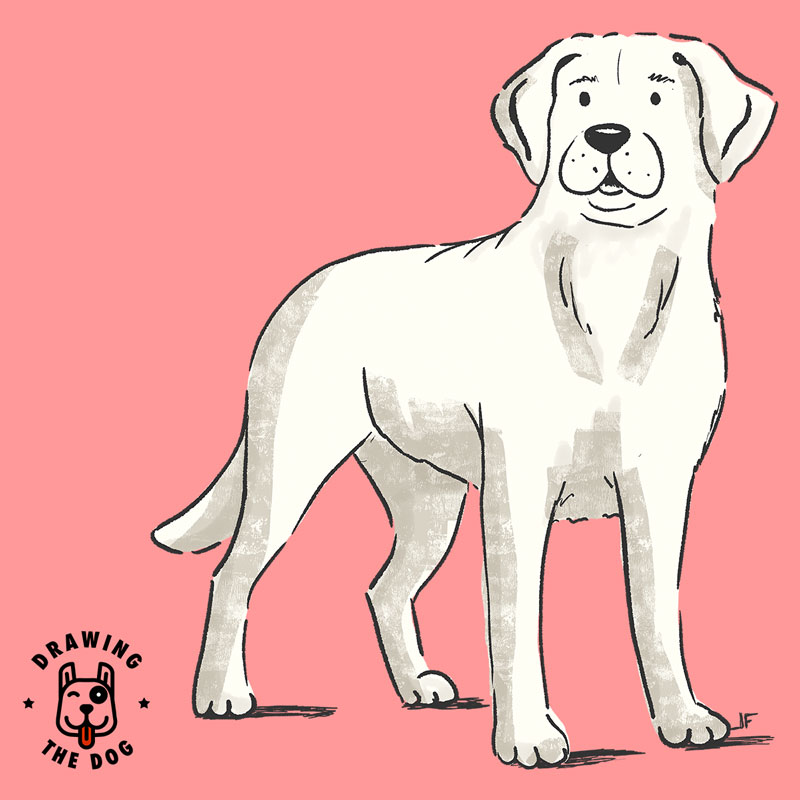Labrador Retrievers 101 – A Guide To Labs
Labrador Retrievers 101:
A Guide To Labs

Everything you need to know about the lovely Labrador breed.
Friendly, loyal, and brimming with energy, Labrador Retrievers are one of the world’s most popular dog breeds. Their affectionate nature and intelligence make them a perfect choice for families, active individuals, and dog enthusiasts alike. In this guide, we’ll look at everything you need to know about Labrador Retrievers — from understanding their temperament to caring for their health, and even decorating your home with Labrador Retriever-themed art prints!
Labrador Quick Facts
| Origin | Newfoundland, Canada |
| Size | 54–57 cm (21.5–22.5 inches) at the shoulder |
| Weight | 25–36 kg (55–80 pounds) |
| Activity level | High; requires daily exercise |
| Group | Sporting |
| Life Span | 10 – 12 Years |
| Good with kids | Yes, very child-friendly |
| Good with cats | Usually adaptable with proper introduction |
| Shedding | Moderate to high |
| Grooming level | Moderate; weekly brushing |
| Training level | High; very trainable and eager to learn |

Brief History Of Labrador Retrievers
Labrador Retrievers, affectionately known as “Labs,” originated in Newfoundland, Canada. Originally, they were bred to assist fishermen by retrieving fish and pulling in nets. Their excellent swimming skills and love for the water have remained to this day, making Labradors naturals around lakes, rivers, and the beach. Today, they are among the top choices for family pets and working dogs worldwide due to their friendly demeanour, intelligence, and versatility.
Physical Characteristics of Labrador Retrievers
Labradors are muscular and sturdy, with a broad skull, kind eyes, and a famously “otter-like” tail. Their powerful build and dense, water-resistant coat suit their original work in retrieving. They come in three main colors: black, yellow, and chocolate. Black Labradors were once the most common, but yellow and chocolate varieties have grown in popularity over the years.
Size and Weight
Males typically stand 56–57 cm (22–22.5 inches) at the shoulder, while females are slightly smaller at 54–56 cm (21.5–22 inches). They generally weigh between 25–36 kg (55–80 pounds), with males being on the heavier end of the range.
Personality and Temperament of Labrador Retrievers
One of the main reasons for the Labrador Retriever’s popularity is their exceptional temperament. They are famously friendly, with an instinct to please, making them quick to form bonds with family members, other pets, and even strangers. Their gentle and patient nature is particularly valued by families with young children.
In addition to their loving personalities, Labs are also very intelligent and observant, which makes them highly trainable and eager to take on challenges. They thrive when they feel purposeful and loved, often excelling in therapy, service, and rescue roles.
Types of Labrador Retrievers
There are two main types of Labrador Retrievers—English and American. While both share the same delightful personality, they differ slightly in build and purpose:
- English Labradors: These are more compact and blocky, often bred for show rather than fieldwork.
- American Labradors: Known for their slender and athletic build, American Labradors are bred primarily for work and hunting.
Training and Intelligence
Labradors are one of the most intelligent dog breeds, ranking high in obedience and working intelligence. Positive reinforcement methods, like treats, praise, and play, work best for this breed. They pick up commands quickly, and their natural enthusiasm for learning makes training sessions enjoyable.
For new owners, starting with basic commands like “sit,” “stay,” and “come” is ideal. With regular practice, Labradors can go on to learn advanced skills and even participate in dog sports like agility and obedience.
Exercise Needs of a Labrador Retriever
Labs are high-energy dogs that require at least one hour of exercise each day to stay healthy and happy. Walking, running, swimming, or playing fetch in a safe area are excellent ways to meet these needs. Engaging them in mentally stimulating activities—like puzzles or scent work—can also help prevent boredom, which might otherwise lead to destructive behaviours.

Get the “Dr Lab Will See You Now” art print.
Check out the cute Dr. Lab print
– original art work for Labrador fans.
Health and Lifespan
With proper care, Labrador Retrievers typically live between 10–12 years. Like all breeds, they are prone to specific health issues, including hip dysplasia, elbow dysplasia, and eye conditions. Regular veterinary checkups, a balanced diet, and exercise are key to ensuring a healthy life.
Common Health Issues:
- Hip and Elbow Dysplasia: Genetic joint conditions that can cause pain or arthritis.
- Progressive Retinal Atrophy (PRA): An eye disorder that can lead to blindness.
- Obesity: Labradors love food and can easily become overweight without controlled feeding.
Ensuring your Labrador receives regular vet care, including vaccinations and preventative care, is essential for early detection and management of these conditions.
Feeding and Nutrition
Labradors have a healthy appetite and can be prone to obesity if overfed. They should have a diet rich in protein to support their muscle structure, along with healthy fats and carbohydrates. Dividing their meals into two servings per day can help control portion sizes and prevent digestive issues. Consult your veterinarian for specific dietary recommendations based on your Labrador’s age, weight, and activity level.
Grooming and Coat Care
Labradors have a double-layered coat that is water-resistant. While they are not hypoallergenic, regular grooming can help manage shedding. Brushing once a week is sufficient for most of the year, but during shedding season, you may want to brush them more frequently. Labradors generally enjoy bath time, especially if you use dog-friendly shampoos that protect their coat’s natural oils.
Grooming Tips:
- Shedding: Expect moderate to high shedding, especially in spring and autumn.
- Nail Trimming: Trim nails monthly, as overgrown nails can be uncomfortable.
- Dental Care: Aim to brush their teeth 2–3 times per week for optimal dental health.
Adopting a Labrador Retriever
If you’re considering bringing a Labrador Retriever into your home, you have several options. Many people choose to go through reputable breeders, while others prefer to adopt from rescue organizations dedicated to Labradors.
Before adopting, consider the time, energy, and resources required to care for an active and social dog. Labradors thrive when they’re part of a loving, engaging family.
Labrador Retrievers and Family Dynamics
Labs are known for their easygoing nature and generally get along well with other dogs, cats, and children. Their patience and playfulness make them ideal playmates for children. However, supervision is recommended with very young kids, as Labradors may unintentionally knock over small children when excited.
If you have other pets, a gradual introduction will help your Labrador adjust and build positive relationships.
Training Your Labrador Puppy
Training a Labrador Retriever puppy requires consistency and positive reinforcement. Start with basic commands like “sit,” “stay,” and “down.” Socializing them from a young age will help them grow into well-rounded, confident adults.
Housebreaking Tips:
- Establish a routine for bathroom breaks.
- Use positive reinforcement for successful outings.
- Be patient; accidents are part of the process.
Fun Activities for Your Labrador Retriever
Labradors enjoy a variety of activities, from outdoor adventures to indoor games. Their high energy makes them natural participants in dog sports like agility, rally, and obedience competitions.
Labrador Retriever Art Prints

Get the “Captain Lab – Special Reserve” art print.
Check out the cute vintage label style print
– original art work for Labrador fans.
For Labrador lovers, having artistic tributes to their furry friends can bring extra joy to the home. Labrador Retriever art prints capture the essence of this beloved breed in various styles, from realistic portraits to playful illustrations. Not only do these art pieces celebrate Labradors, but they also make unique and thoughtful gifts for dog owners.
Whether you’re decorating a family room, a child’s play area, or a cosy nook, Labrador Retriever art prints can make a perfect addition. Browse our Labrador Retriever art prints here to find the perfect piece for your space!
FAQs
What is the lifespan of a Labrador Retriever?
Labradors typically live between 10–12 years with proper care.
How much exercise does a Labrador Retriever need?
Labradors need at least one hour of exercise each day to stay happy and healthy.
Are Labradors good with other pets?
Yes, Labradors are usually good with other pets, especially with proper introduction and socialization.
How often should I groom my Labrador?
Weekly brushing is typically sufficient, but more frequent grooming may be needed during shedding seasons.
Is a Labrador Retriever a good choice for first-time dog owners?
Yes, their friendly nature and trainability make Labradors a great choice for first-time owners.
What is the difference between an English and an American Labrador?
English Labs are stockier and often bred for show, while American Labs are leaner and bred for work.
Conclusion
Labrador Retrievers are truly a breed that has something for everyone. Their loyalty, intelligence, and boundless energy make them an ideal choice for individuals and families who can provide them with love, training, and plenty of exercise. Whether you’re a proud owner or considering adopting one, Labradors bring joy, companionship, and a lot of fun to any home. If you’re looking to celebrate your Labrador in style, check out our selection of Labrador Retriever art prints to capture the spirit of this beloved breed in your home.
Other information sources
Labrador Retriever Club
American Kennel Club – Labrador Retriever





